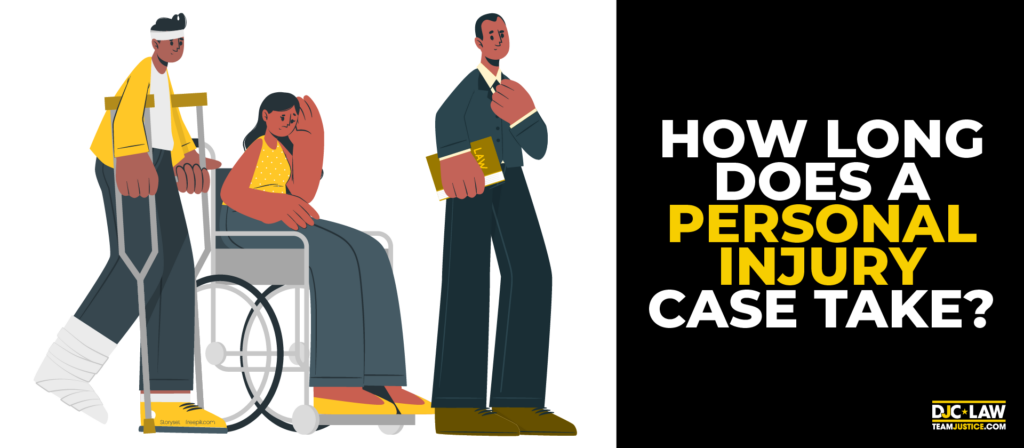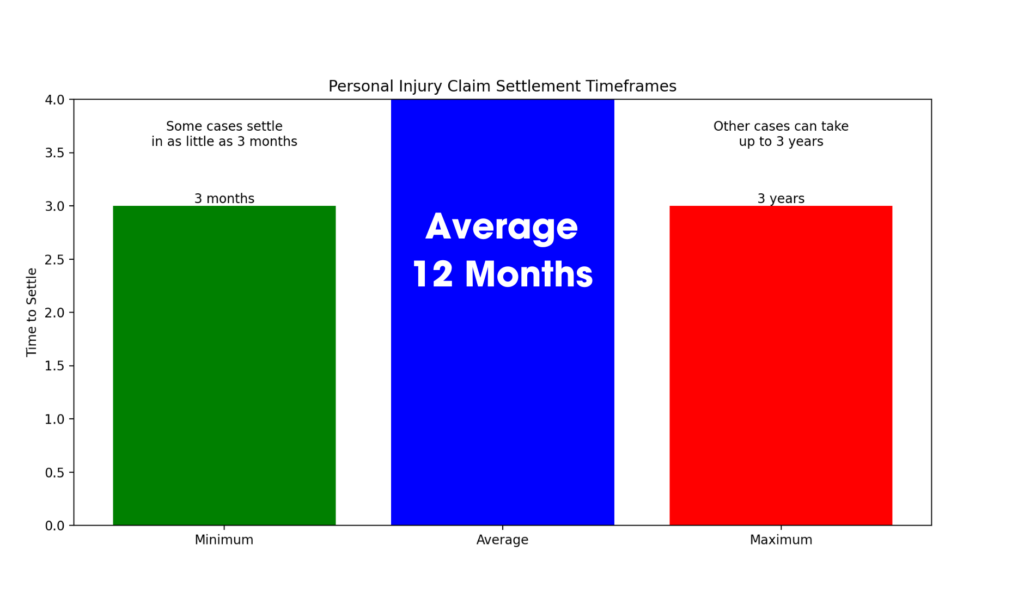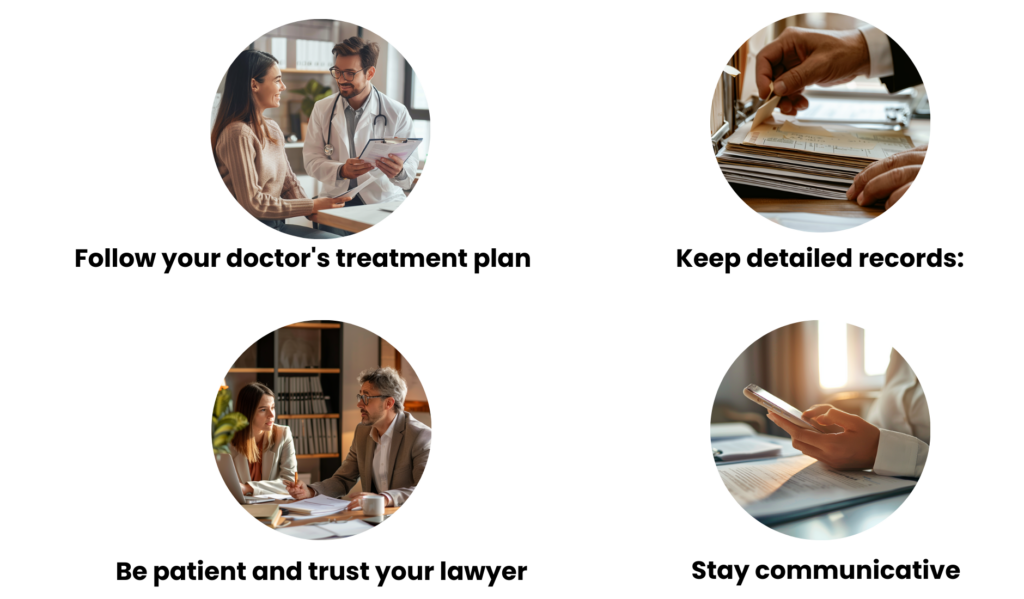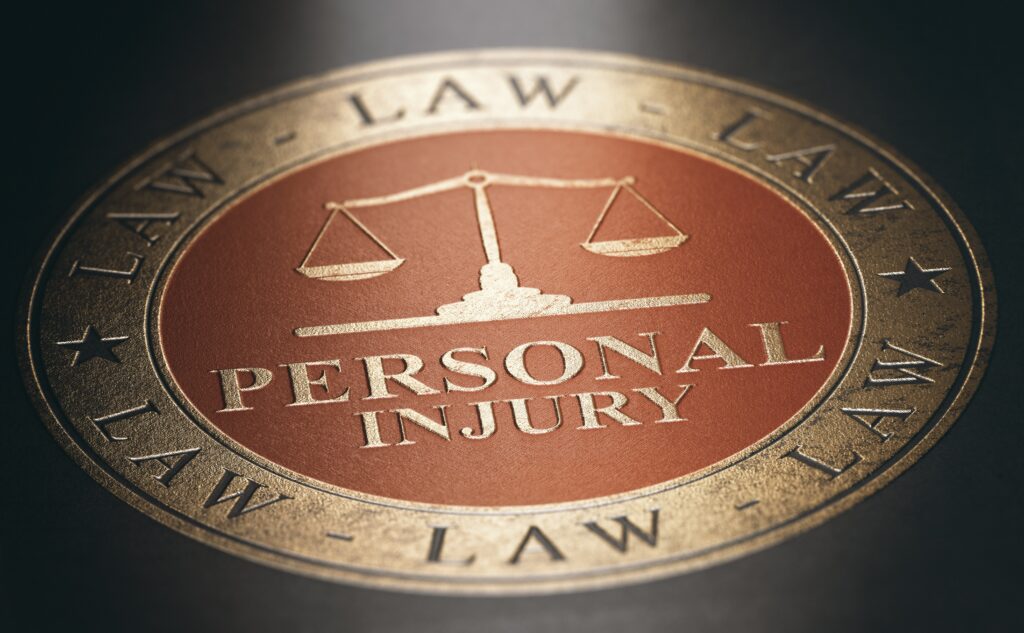
Some cases will settle in as little as 3 months while other cases can take up to 3 years. From our 30+ years of experience, on average the timeframe for a personal injury claim to settle is 12 months. However, every case is unique, and the time it takes to reach a settlement can vary significantly.

Key Takeaways
- Personal injury cases can take 3 months to 3 years to settle.
- The average personal injury case takes 12 months
- The key factors influencing the duration of a personal injury lawsuit are the severity of injuries, case complexity, and the at-fault party’s insurance company’s cooperation.
- Severe injuries take more time to settle because of the amount of medical treatment and recovery.
- Complex cases especially those with disputed liability or multiple parties can extend the timeline.
- Insurance companies will delay settlements by denying liability or offering low initial offers.
- Having experienced personal injury lawyers is key to navigating these and getting fair compensation.
What are the Factors That Affect Personal Injury Settlement Timelines?
Regarding personal injury cases, several key factors can greatly influence how long it takes to reach a settlement.
The Severity of Your Injuries
The severity and extent of your injuries play a huge role in determining how long your case may take to settle. Generally, cases involving more serious injuries, such as traumatic brain injuries, spinal cord damage, or multiple fractures, take longer to resolve than those with minor injuries like whiplash or soft tissue damage.
Severe injuries often require extensive medical treatment and longer recovery times and may have a more significant impact on your life. Your lawyer will want to wait until you have reached maximum medical improvement (MMI) before settling your case.
MMI is when your condition has stabilized, and further improvement is unlikely, even with additional treatment. This allows your attorney to accurately assess the full extent of your damages and pursue fair compensation.
The Complexity of Your Case
Some personal injury cases are simpler than others. For example, if a distracted driver rear-ended you and admitted fault, your case may settle relatively quickly. However, if a dispute over liability or multiple parties are involved, your case can become more complicated and take longer to resolve.
Other factors that can complicate your case include:
- Lack of evidence or conflicting witness statements
- Pre-existing medical conditions that make it challenging to prove the extent of your accident-related injuries
- Involvement of government entities or large corporations, which may have more resources to fight your claim
In such situations, your lawyer may need to conduct a thorough investigation, consult with professionals, and engage in extended negotiations or litigation to secure a fair settlement. This involves gathering evidence, interviewing witnesses, and analyzing medical records.
Your attorney will work diligently to build a strong case, advocating for your rights and seeking the compensation you deserve. Throughout this process, they'll keep you informed and provide guidance.
The Insurance Company's Cooperation
The at-fault party's insurance company plays a large role in the settlement process. Some insurance companies are more cooperative than others and may be willing to negotiate in good faith to reach a fair settlement quickly. However, others may use tactics to delay the process or minimize the amount they have to pay out.
Common insurance company tactics include:
- Denying liability or disputing the extent of your injuries
- Offering a low initial settlement in hopes that you'll accept it out of desperation
- Requesting unnecessary documentation or engaging in prolonged back-and-forth communications
- Dragging out the process to wear you down and pressure you into accepting a lower settlement
An experienced personal injury lawyer will be familiar with these tactics and know how to counter them effectively. They will advocate for your rights and work to hold the insurance company accountable for fair compensation.
The Legal Process and Court Schedules
If you cannot settle your case through negotiations and must file a personal injury lawsuit, the legal process itself can impact the timeline.
The litigation process involves several stages, including:
- Filing the complaint and serving the defendant
- Discovery, where both sides exchange information and evidence
- Pre-trial motions and hearings
- Mediation or settlement conferences
- If the parties don't settle, there is a trial
Each stage takes time, and the court's schedule can also affect how quickly your case progresses. Courts often have a backlog of cases, and it may take months or even years to secure a trial date.
However, most personal injury cases settle before trial, as both sides often prefer to avoid the added time, expense, and uncertainty of a court battle.
What You Can Do to Help Your Personal Injury Case Progress?

While much of the settlement process is out of your control, you can help your case move forward:
- Follow your doctor's treatment plan: Attend all medical appointments, follow your prescribed treatment, and document your progress. This helps your recovery and strengthens your claim by providing clear evidence of your injuries and their impact on your life.
- Keep detailed records: Maintain copies of all accident-related documents, including police reports, medical bills, insurance correspondence, and receipts for out-of-pocket expenses. This will make it easier for your lawyer to build a strong case on your behalf.
- Be patient and trust your lawyer: The legal process can be frustrating, and it's natural to want your case resolved quickly. However, it's important to be patient and trust that your lawyer is working hard to secure the best possible outcome for you. Rushing to accept a low settlement offer can ultimately hurt your ability to recover fair compensation.
- Stay communicative: Promptly respond to your lawyer's requests for information or documentation, and keep them updated on any changes in your medical condition or treatment. Open communication helps your case progress smoothly.
How does the personal injury claim process work?

Before diving into the factors that affect settlement timelines, you must understand the basic steps involved in a personal injury claim:
Seeking Medical Attention
When you've suffered an injury in an accident, the most important thing to do is get medical help immediately. Even if you don't think your injuries are serious, see a doctor as soon as possible.
Going to the doctor ensures you get the care you need to feel better and create a record of your injuries. You need this documentation for your personal injury claim. It proves that you suffered an injury and shows the extent of your injuries.
Follow all of your doctor's instructions for treatment, whether that means taking medication, going to physical therapy, or getting rest. This will help you heal faster and demonstrate that you're taking your injuries seriously and doing everything possible to recover.
Remember, always make your health your priority after an accident. Don't wait to get medical attention—the sooner you see a doctor, the better it is for your well-being and your personal injury case.
Hiring a Personal Injury Lawyer
After you've taken care of your immediate medical needs, the next step is to find a personal injury lawyer to represent you. You might feel tempted to handle the case on your own, but working with an experienced attorney can make a huge difference in the outcome of your claim.
Personal injury law can be complicated, and insurance companies often have teams of lawyers working to pay out as little as possible. Your Austin personal injury lawyer will be your advocate, ensuring your rights are protected and fighting to get you the compensation you deserve.
A good personal injury attorney will guide you through every step of the legal process. They'll gather evidence to support your claim, handle all communication with the insurance companies, and negotiate on your behalf to get you a fair settlement. If necessary, they'll even take your case to trial.
When choosing a personal injury lawyer, look for someone with experience handling cases like yours. Schedule a consultation to discuss your case and understand the lawyer's communication style and approach. You can concentrate on your body with the right lawyer while they handle the legal heavy lifting.
Investigation and Evidence Gathering
Building a strong personal injury case requires thorough investigation and evidence gathering. This is where your personal injury lawyer's knowledge comes into play.
Your attorney will start by investigating the details of your accident. They'll review police reports, interview witnesses, and, if necessary, consult with expert witnesses like accident deconstructionists to get a clear picture of what happened and who was at fault.
They'll also gather evidence to document your injuries and their impact on your life.
This may include:
- Medical records and bills
- Pay stubs or other proof of lost income
- Photos of your injuries
- Journal entries about your pain and emotional struggles
The more evidence your lawyer can compile, the stronger your case will be. By clearly showing the extent of your damages, they can fight for a settlement that fully compensates you for what you've been through.
This process can take time, but it's important for building a solid foundation for your claim. Your lawyer will keep you informed throughout the investigation and evidence-gathering phase, and they'll use this information to craft a compelling case on your behalf.
Demand Letter and Negotiation
Once your lawyer has gathered strong evidence to support your claim, they'll send a demand letter to the at-fault party's insurance company. This letter outlines your case, detailing your injuries, the treatment you've received, and the impact the accident has had on your life.
The demand letter will also include a request for compensation. Your lawyer will calculate a fair settlement amount based on your medical bills, lost income, pain and suffering, and any long-term impacts of your injuries.
The negotiation process typically begins after the insurance company receives the demand letter. The insurance company will likely make an initial offer, which is often less than what you need. Your lawyer will then counter with a higher amount, and the back-and-forth will continue until both sides can agree on a settlement.
During negotiations, your lawyer will advocate for your interests. They'll use the evidence they've gathered to justify your demand and push back against any attempts by the insurance company to minimize your claim.
Negotiation can take weeks or even months, depending on the complexity of your case and the willingness of the insurance company to come to a fair agreement. Throughout the process, your lawyer will keep you informed and get your input on any major decisions.
Filing a Lawsuit (If Necessary)
You can often settle personal injury claims through negotiation without ever needing to file a lawsuit. However, if the insurance company refuses to offer a fair settlement, your lawyer may recommend taking your case to court.
Filing a lawsuit initiates the litigation process. This begins with your lawyer drafting and filing a complaint, a legal document outlining your case, and the compensation you seek. You then serve the complaint to the defendant (the person or company you're suing), who can respond.
From there, the case moves into the discovery phase. This is where both sides exchange information and evidence, take depositions (sworn statements) from witnesses, and build their legal strategies.
If you cannot agree on a settlement, your case will eventually go to trial. Both sides will present their evidence and arguments to a judge or jury during the trial, who will decide the case's outcome.
The litigation process can be lengthy, often taking a year or more to resolve. However, you can still settle a lawsuit at any point before a verdict is delivered. In fact, the pressure of an impending trial date can sometimes motivate insurance companies to offer a fair settlement to avoid the uncertainty of a jury decision.
Having experienced legal representation is key to navigating these challenges and obtaining fair compensation."
Now that you have a general understanding of the process let's examine the factors that can impact the timeline of your personal injury case.
When do you actually receive your Compensation?
Once your case settles (through negotiation or after a trial), the insurance company will typically send your lawyer a check for the agreed-upon amount. Your lawyer will deduct their fees and costs, pay any outstanding medical bills or liens, and then give you the remainder.
This process can take a few weeks to a couple of months, depending on factors such as how long it takes the insurance company to process the payment and whether there are any complications with liens or bills that need to be sorted out.
But once you have your money, you can finally put this whole ordeal behind you and move on with your life.

